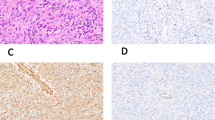Play all audios:

ABSTRACT A new human rhabdomyosarcoma cell line (HX170c) has been established from a paratesticular embryonal tumour in a 5-year-old male. The cells grew as an adherent monolayer with a
doubling time of 32 h and showed pleomorphic features. Intermediate filament analysis revealed the line to be mesenchymal in origin (reactivity to vimentin and desmin antibodies). The line
was tumorigenic in nude mice, possessed elevated levels of creatine phosphokinase (mainly of the MM isoenzyme form) and had a near diploid mean chromosome number of 50. In vitro cell cloning
determinations gave colony forming efficiencies of 0.01% in soft agar and 24% in a monolayer anchorage-dependent assay. Radiosensitivity determinations using a monolayer clonogenic assay
with feeder layer support showed the cells to be among the more radiosensitive human tumour cell types (surviving fraction at 2 Gy of 0.26) that have been investigated. Furthermore,
experiments utilising continuous low dose rate radiation at 3.2 cGy min-1, showed that, under these experimental conditions, the cells possessed only a very low capacity to recover from
radiation-induced damage (dose reduction factor at 1% cell survival of 1.07 for 150 versus 3.2 cGy min-1). As other human tumour cells of an embryonal cell origin (e.g. neuroblastoma and
germ cell tumours of the testis) have also been shown to be radiosensitive it appears that sensitivity to radiation may be a common property of this group of tumours. Access through your
institution Buy or subscribe This is a preview of subscription content, access via your institution ACCESS OPTIONS Access through your institution Subscribe to this journal Receive 24 print
issues and online access $259.00 per year only $10.79 per issue Learn more Buy this article * Purchase on SpringerLink * Instant access to full article PDF Buy now Prices may be subject to
local taxes which are calculated during checkout ADDITIONAL ACCESS OPTIONS: * Log in * Learn about institutional subscriptions * Read our FAQs * Contact customer support SIMILAR CONTENT
BEING VIEWED BY OTHERS “INFLAMMATORY LEIOMYOSARCOMA” AND “HISTIOCYTE-RICH RHABDOMYOBLASTIC TUMOR”: A CLINICOPATHOLOGICAL, IMMUNOHISTOCHEMICAL AND GENETIC STUDY OF 13 CASES, WITH A PROPOSAL
FOR RECLASSIFICATION AS “INFLAMMATORY RHABDOMYOBLASTIC TUMOR” Article 22 October 2020 CHARACTERIZATION OF A PLEOMORPHIC RHABDOMYOSARCOMA CELL LINE Article Open access 23 January 2025
CHARACTERIZATION OF A RHABDOMYOSARCOMA REVEALS A CRITICAL ROLE FOR SMG7 IN CANCER CELL VIABILITY AND TUMOR GROWTH Article Open access 22 June 2023 AUTHOR INFORMATION AUTHORS AND AFFILIATIONS
* Radiotherapy Research Unit, Institute of Cancer Research, Sutton, Surrey, UK LR Kelland Authors * LR Kelland View author publications You can also search for this author inPubMed Google
Scholar * L Bingle View author publications You can also search for this author inPubMed Google Scholar * S Edwards View author publications You can also search for this author inPubMed
Google Scholar * GG Steel View author publications You can also search for this author inPubMed Google Scholar RIGHTS AND PERMISSIONS Reprints and permissions ABOUT THIS ARTICLE CITE THIS
ARTICLE Kelland, L., Bingle, L., Edwards, S. _et al._ High intrinsic radiosensitivity of a newly established and characterised human embryonal rhabdomyosarcoma cell line. _Br J Cancer_ 59,
160–164 (1989). https://doi.org/10.1038/bjc.1989.34 Download citation * Issue Date: 01 February 1989 * DOI: https://doi.org/10.1038/bjc.1989.34 SHARE THIS ARTICLE Anyone you share the
following link with will be able to read this content: Get shareable link Sorry, a shareable link is not currently available for this article. Copy to clipboard Provided by the Springer
Nature SharedIt content-sharing initiative
